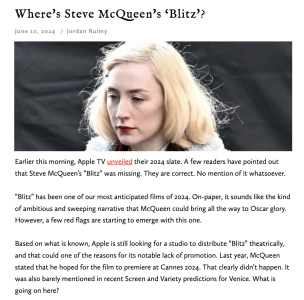The only difference is (a) Dennis Hopper wasn’t the mad bus bomber but the hijacker, (b) there was no bomb on the bus set to explode if the bus slowed to under 50 mph, and (c) there was no Keanu Reeves or Sandra Bullock behind the wheel.
Daily
Instant Combustion
I knew in a millisecond that this Chanel model has “it” — something in the perfect symmetry of her features that makes you sit up.
Her name is Mona Tougaard, a Danish model currently ranked in the top 50 fashion models at models.com. She comes from Danish, Turkish, Ethiopian and Somali ancestry. (Thanks to HE reader Elio Miguel Garcia Jr.)We’re living through an age in which beauty isn’t the passport it used to be and may even be regarded suspiciously in some corners, but an unsuppressable “whoa” kicked in anyway.

Tougaard reminded me instantly of the late Rosenda Monteros, who played ”Petra”, Horst Buccholz’s love interest, in The Magnificent Seven (‘60) — the mostly silent peasant girl with the smoldering expression.
Monteros also costarred in Tiara Tahiti (‘62) with James Mason and John Mills.

Will Mendes’ Beatles Project Basically Be Rutles Redux?
I was amused and vaguely engaged by The Rutles, who flashed and then receded in 1978’s All You Need Is Cash. What was my reaction to the four Beatle-ish impersonators — Eric Idle, Ricky Fataar, John Halsey and Neil Innes? Meh, fine, whatevs — neither irritants nor charmers.
Sam Mendes’ not-yet-filmed or even written quartet of Beatles films will open in 2027, and my reaction to the four actors rumored to play the lads is, right now at least, vaguely defined by gloom and trepidation. My dominant thought is “are these guys going to create Fab Four impressions in a Rutles–like way…not in a satiric fashion, obviously, but in a way that sorta kinda underwhelms?”
Put another way, my basic attitude about the Mendes project —— and more particularly the casting of HE faves Paul Mescal and Barry Keohgan as Paul McCartney and Ringo Starr —- is partly hostile but mostly “I’d like to be able to survive this, but Jesus… really?”
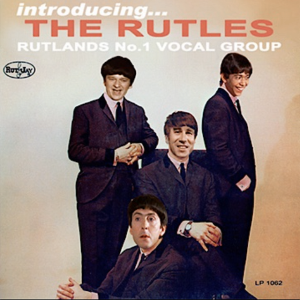
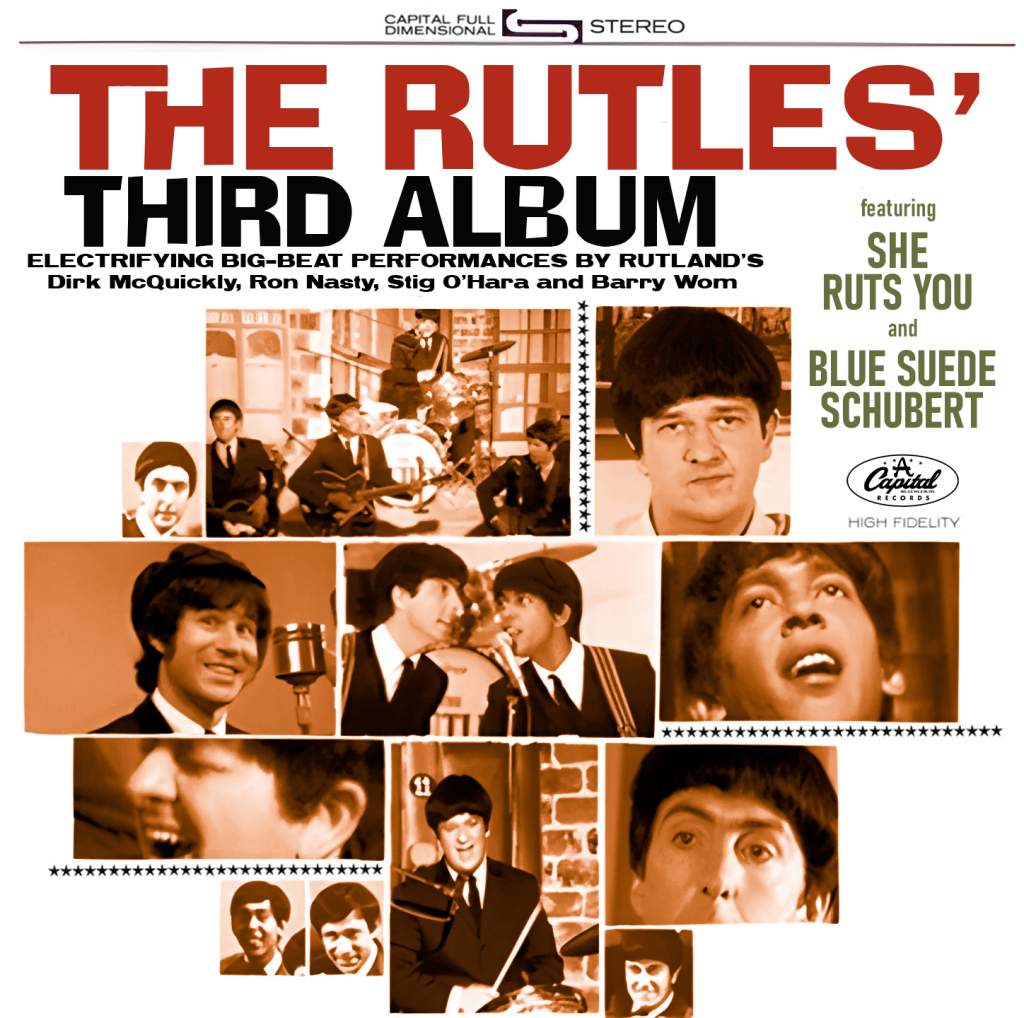
Obviously very little physical resemblance — one of those submit-or-hate ensemble casting decisions that can’t hope to transport, much less astonish.
Harris Dickinson and Charlie Rowe might pass muster as John and George, but Mescal is too old (thick-featured, not slender enough, lacking that freshly-bloomed quality) to play 20something Paul, and the warlock-eyed, beestung-nosed Keohgan, 31, will be a total disaster as Ringo…way too old and certainly too satanic to become that easygoing, low-key, sad-eyed, vaguely frustrated guy in A Hard Day’s Night.
Ringo’s honker was bigger than Keohgan’s, but also narrower and much less of an eyesore.
I’m sorry but speaking as a Beatles fan the idea of two of HE’s most deeply loathed actors sullying the reputations of McCartney and Starr…talk about your tailspins of depression.
Tim Grierson has written that the zero-resemblance factor among the Mendes quartet is a “good” thing. I don’t know what he’s talking about. Okay, I do know but it’s not enough.
Note: Yes, the comment mechanism briefly stopped working, but now it’s working again. I thought it was repaired last night but not altogether. Kim is working on a solution as we speak.
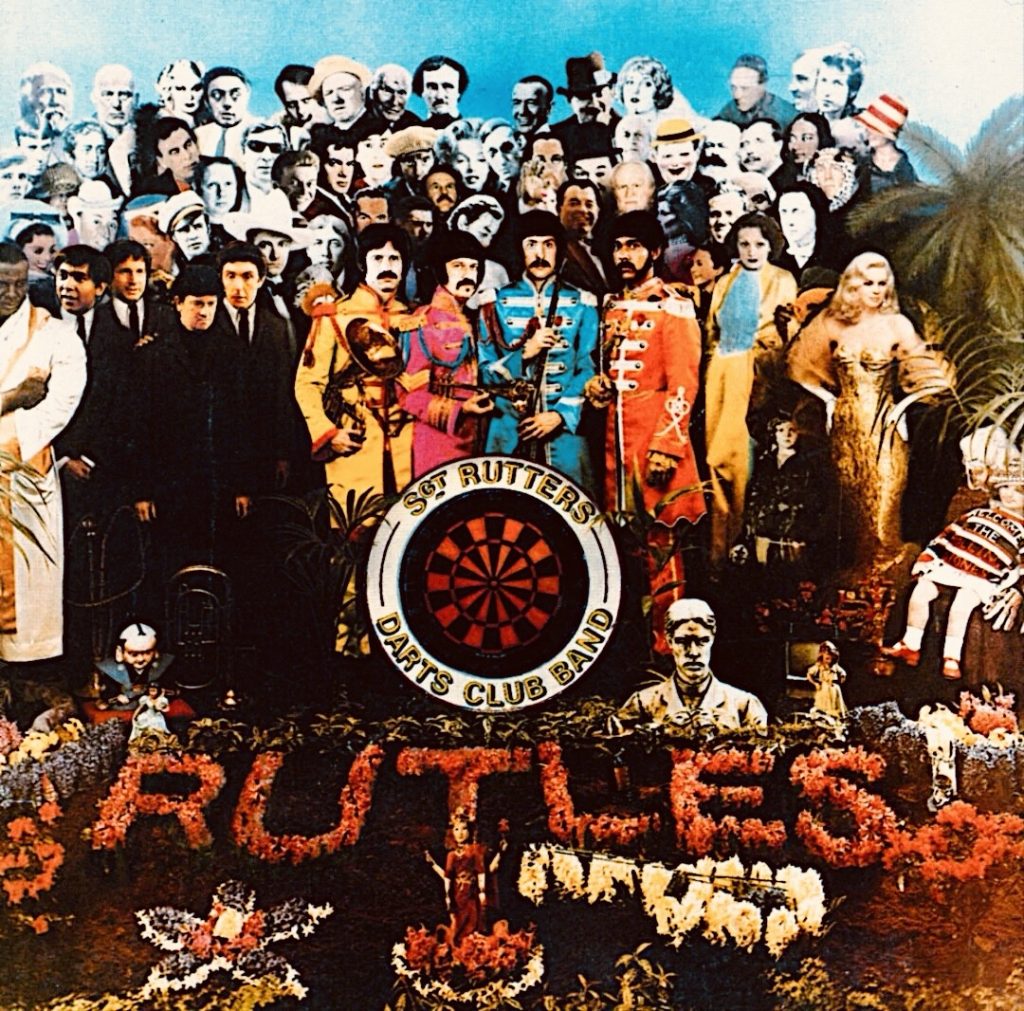
Return of “Only Living Timberwolf in New York City’
Who remembers Marc Webb and Allan Loeb‘s The Only Living Boy in New York (Roadside /Amazon, 8.11.17)? Did anyone see it? It opened almost seven years ago (i.e., eight months into the Trump administration), and a few months before the woke plague began to infect the urban liberal bloodstream.
I happened upon my review this morning and was wondering “wow, I wonder if anyone waded into this film….seven years ago is a substantial block of time.”
I found it pretty close to awful. I despised each and every well-heeled, Manhattan-residing character, but that’s a roundabout way of saying I loathed Loeb’s screenplay, which struck me as grating and precious.
Okay, I liked the line about Philadelphia being New York City’s most culturally vibrant neighborhood but that’s about it.
Loeb, remember, wrote the execrable Collateral Beauty, a Will Smith grief-recovery film which was also set in flush NYC environs. That touchy-feely ordeal was enough to condemn Loeb to a five-year sentence on a Southern chain gang, side by side with Paul Newman, George Kennedy and the others. Now he’s earned himself a life term on Devil’s Island with Steve McQueen and Dustin Hoffman. The man specializes in manipulative emotional goo.
Callum Turner is Thomas, a somewhat whiny, spectacle-wearing, 20something bore who’s attempting a career as a serious writer and who works as a Rizzoli-like book store to make ends meet. [News flash: No New Yorker can make ends meet in Manhattan on a retail-clerk salary.]
Thomas, who bears an extraordinary resemblance to a Northwestern timber wolf, is the son of Ethan (Pierce Brosnan), a mildly imperious book publisher, and a jittery mom, Judith (Cynthia Nixon).
Thomas is in a not-quite-there relationship with Mimi (Kiersey Clemons) who’s pretty and wise but (be honest) chubby and destined for Queen Latifah-like proportions by the time she hits her mid 30s.
Early on a grizzled 60ish alcoholic writer (Jeff Bridges) appears in Thomas’ Lower East Side apartment building and quickly becomes the kid’s avuncular wisdom-dispenser. Typical Bridges dialogue: “Schnorrrr-roar-urp-urp-schnorrrr-roarr-uhhrr,” etc.
A scene or two later Thomas and Mimi happen to spot Ethan having a cozy romantic dinner with Johanna (Kate Beckinsale), an extra-marital lover. Alarmed but also a tad aroused, Thomas begins stalking Johanna. They immediately start fencing and parrying, and before you know it Thomas is putting the high, hard one, etc.
Why is Johanna open to going stereo with Brosnan’s son? It doesn’t seem to make sense but she goes there regardless, and without telling Brosnan, of course, and so it’s dick dick dick dick dick dick dick dick dick dick dick dick dick dick dick dick dick for this mama-san.
And then in Act Three comes a semi-startling piece of news that alters the dynamic between these completely tiresome characters. You don’t want to know, trust me. My main reaction was “what’s with all the secrecy? Is this a Nathaniel Hawthorne novel in which mothers and wives have to hide secrets and atone for decades or at least carry guilt around for their past sins?”
Do The Time!
We’ve all known for years that Hunter Biden is “a wrong one”…a bad seed, a rotten apple, a fellow of deplorable character. He needs to go to jail, wear the orange jumpsuit…no getting off easy. His dad obviously needs to throw him under the bus and “walk away”, if only for appearance’s sake.


Condolences
We all have to pay the bills but…
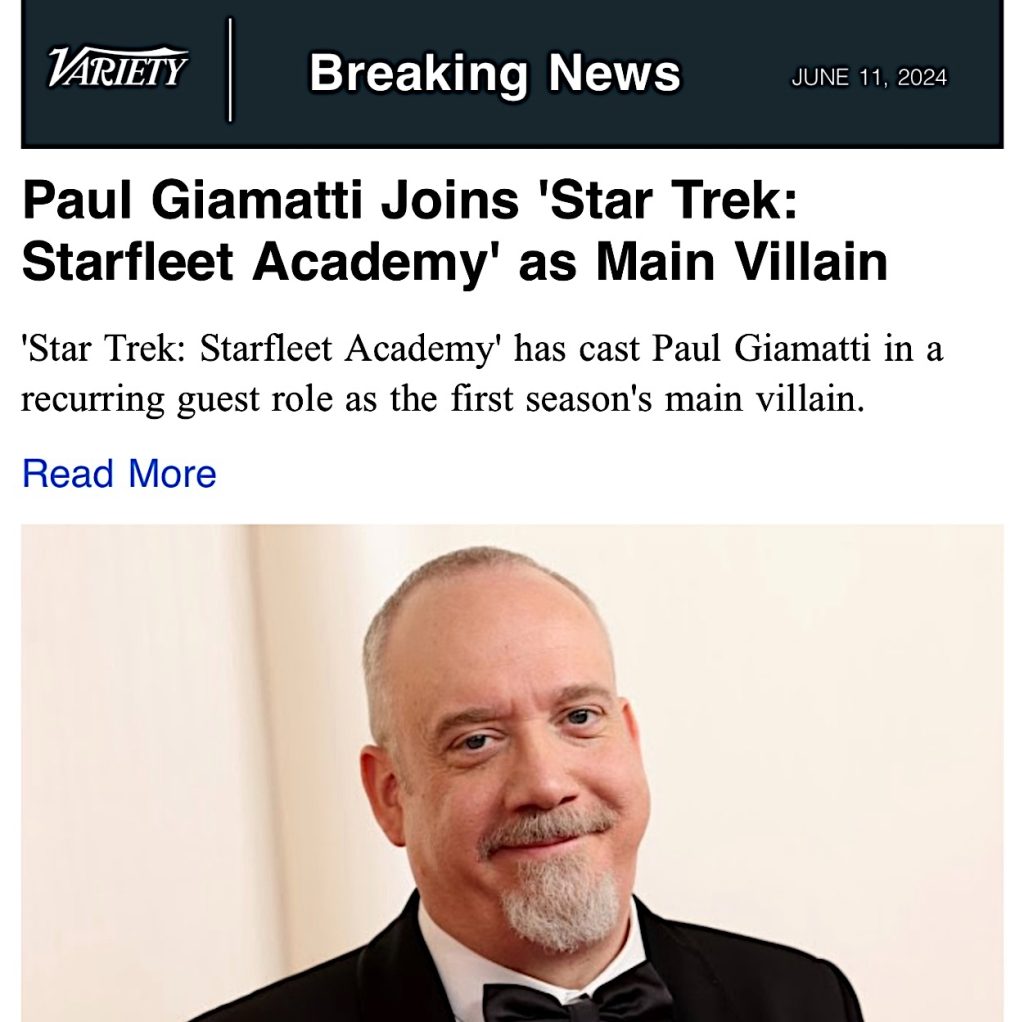
[Update] Comment Blocking Problem Apparently Solved
[6:05 pm] TheRE waS a technical issue that surfaceed three or four hours ago…possibly a Disqus issue, possibly a WordPress plugin problem. Iengaged an excellent freelance WordPress person named Kim, and she’s remedied the problem to a certain extent. So we’re out of the woods as we speak. Thanks, Kim! For the time being, at least.
No Oscar Noms for Body-Horror Anything
A handicapping friendo who didn’t see Substance in Cannes, and therefore was unsure about Demi Moore‘s chances of snagging a Best Actress nom, got in touch yesterday: “Does Demi Moore have a shot at a Best Actress nom?”
HE to friendo: “Moore soldiers through Substance, but it’s a smart body-horror exploitation film with a feminist sheen. Appreciation and respect, but no Oscar action. Okay, she might be nominated because of the metaphor of women suffering on the altar of wanting to looking younger, and because voters might figure Moore deserves an honorary gold watch because she’s a former Brat Packer in her early 60s. And because it’s a weak year.”
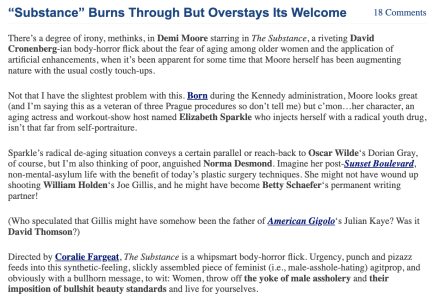
Radioactive “Conqueror”
We’ve all read about the many people who worked on Dick Powell‘s The Conqueror in ’54, and wound up succumbing to cancer in the ’60s and ’70s. John Wayne died from cigarettes, but Powell and costars Susan Hayward and Pedro Armendáriz were probably fallout victims.
This trailer for The Conqueror: Hollywood Fallout suggests frankness, intelligence. It’s probably a decent effort. I’ve asked for a link. It opens on 6.28.
 .
.
John Wayne‘s Temujin to Pedro Armendariz‘s Jamuga: “This Tartar woman is for me…my blood says ‘take her'”
Above and beyond the camp factor, The Conqueror is primarily known as the worst radioactive fallout and subsequent cancer affliction film in Hollywood history.
Exteriors happened in the vicinity of St. George, Utah, which is 137 miles (220 km) downwind of the United States government’s Nevada National Security Site. It received the brunt of nuclear fallout from testing active in this period.
“In 1953, 11 above-ground nuclear weapons tests occurred at the site. By the end of 1980, as ascertained by People magazine, 91 cast and crew members had developed some form of cancer and 46 had died of the disease.”
Wikipage excerpt: “Director Dick Powell died of cancer in January 1963, seven years after the film’s release. John Wayne, Susan Hayward and Agnes Moorehead all died of cancer in the 1970s. Pedro Armendáriz was diagnosed with kidney cancer in 1960, and killed himself in June 1963 after he learned his condition had become terminal.
“Several of Wayne and Hayward’s relatives who visited the set also had cancer scares. Michael Wayne developed skin cancer, his brother Patrick had a benign tumor removed from his breast, and Hayward’s son Tim Barker had a benign tumor removed from his mouth.”
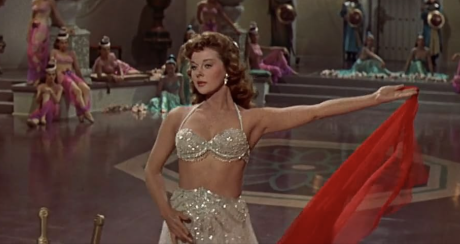
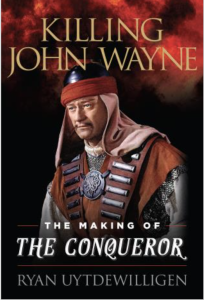
“Blitz” Panic
A friend, going on the word of a colleague, has just told me Steve McQueen‘s Blitz is allegedly “great.” Good to hear!
And yet World of Reel‘s Jordan Ruimy is rattled about what he’s hearing, or not hearing rather.
I’m asking right now for someone else to tell me that Steve McQueen‘s forthcoming Germany-bombing-Londoners-during-WWII movie, titled Blitz, is at least pretty good.
Blitz‘s Wiki page says it’s an Apple TV + thang. This morning Apple announced its original series 2024 slate and didn’t even mention Blitz in passing…not a blurt or a blurb.
Blitz is one of my biggest high-expectation flicks of the fall. Venice, Telluride…come to papa.
I worship McQueen so please save me from falling into a pit of despair. And I don’t want to hear a “have faith!” pep talk. I want the skinny.
It is my humble opinion that McQueen is incapable of making a serious shortfaller. It’s not in him. It’s flat-out inconceivable. I’m not fucking around here. This is serious.
I’ve written some folks to let’s see what develops.
